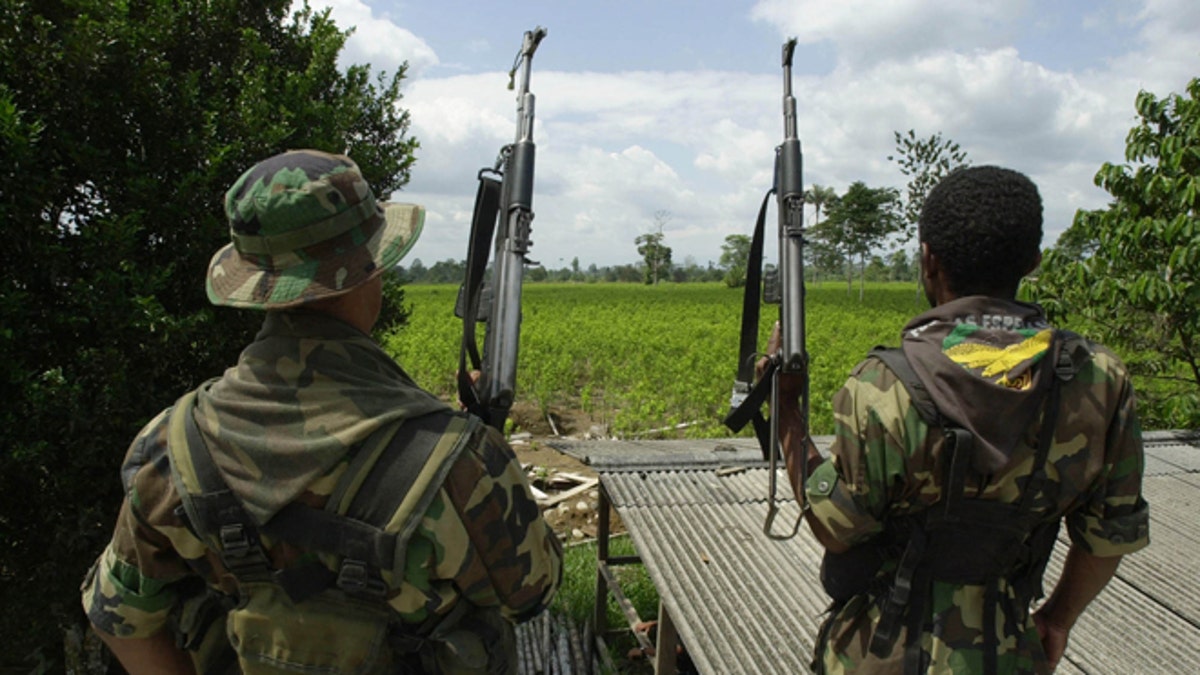
384090 01: ***EXCLUSIVE*** Two members of the AUC, the United Self Defense Force of Colombia, the extreme right paramilitary group, patrol a coca leaf plantation where a manual eradication of the coca leaves has gone into effect January 8, 2001 in the province of Putumayo, Colombia. Since the U.S. aid plan for Colombia began last December 15, the AUC are manually destroying coca leaves with machetes in and around the vast areas of coca leaf plantations south of Putumayo. The Colombian leftist guerrilla group, the FARC, is attempting to take control of areas that were under their control, not more than a year ago. (Photo by Piero Pomponi/Newsmakers) ((Photo by Piero Pomponi/Newsmakers))
Less than a month after the Colombian government and the Revolutionary Armed Forces of Colombia (FARC) declared a cease-fire and rebel disarmament deal that could lead to the end of 52-years of civil conflict, one of the guerrilla group’s largest units has said it will not lay down its arms or demobilize under the potential peace deal.
The announcement by the FARC’s Armando Rios First Front, a unit of between 60 and 200 fighters who inhabit the dense jungle of Colombia’s southeastern Guaviare province, is the first sign that that the rebel group may not be as united in demobilizing as its leaders have suggested.
"We have decided not to demobilize. We will continue the fight for the taking of power by the people for the people, independent of the decision taken by the rest of the members of the organization," the unit said in a statement released on Wednesday.
The First Front, which is notorious for kidnapping former Colombian presidential candidate Ingrid Betancourt and three American contractors as well as having extensive connections in the country’s cocaine trade, voiced their concerns about the peace deal reached between the FARC leadership and the government of President Juan Manuel Santos.
The unit said that the accord will not alleviate the social and economic problems that first led the FARC to take up arms against the Colombian government in 1964.
Experts, however, are skeptical of the unit’s claims that they want to continue the fight for social injustice in the South American nation.
“They identify with small scale coca growers and don’t want to be put in charge of eradicating the coca crops,” Adam Isacson, a senior associate for regional security policy at the Washington Office on Latin America, told Fox News Latino. “That’s their political base. That’s who supports them.”
In some rural sections of the country, the FARC as a whole are widely disliked by the Colombian people, and guerrilla leaders are hoping that the peace process can help them repair that image and become a political force like the Farabundo Martí National Liberation Front (FMLN) did in El Salvador following the Central American nation’s bloody civil war in the 1980s and '90s.
“That’s the plan, to make the FARC into a political movement,” Isacson said. “They have their eyes on the municipal 2018 elections.”
That’s why the First Front’s recent pronouncement has become a thorn in the side for FARC commander Rodrigo Londoño, better known as Timochenko, who helped negotiate the peace deal in Cuba, especially as the group ties to figure out how to integrate the guerrillas back into civil society.
While both sides agreed on a demobilization plan that will have guerrillas move into rural areas and hand over their weapons, it is yet to be seen how the plan will be put into practice and how some rebels will take giving up their jobs as soldiers and handing over their weapons.
“There’s always been the issue of 'What are these people going to do when they lay down their arms?',” Chris Sabatini, a professor at Columbia University's School of International and Public Affairs, told FNL. “It’s not like they’re going to become hairdressers or bankers.”
The major concern is that guerrillas unwilling to demobilize will either join with the National Liberation Army (ELN) – the country’s second-largest guerrilla group and one that the FARC was once at war with – or become even more deeply involved in the country’s drug trade. Some experts believe that between 10 and 30 percent is a conservative estimate of FARC guerrillas who will go into organized crime after the accord is signed.
The proliferation of cocaine has fueled the conflict longer than any other in Latin America and will remain a powerful magnet for criminal gangs operating in Colombia's remote valleys and lawless jungles. Colombia is the largest supplier of cocaine to the U.S., and only a small fraction of the country's 12,000-plus homicides last year had anything to do with the conflict.
“They are already engaged in it, and so many of them rely on this illicit trade,” Sabatini said.
The peace deal, which is expected to be formally signed later this month, could face difficulties due to the rebels' deep unpopularity and the desire for revenge still felt by many Colombians over a conflict that has killed so many and displaced millions. Supporters of the peace process also fear that too many voters could simply stay home, threatening to leave the referendum below the participation threshold needed to be valid.
The Associated Press contributed to this report.
